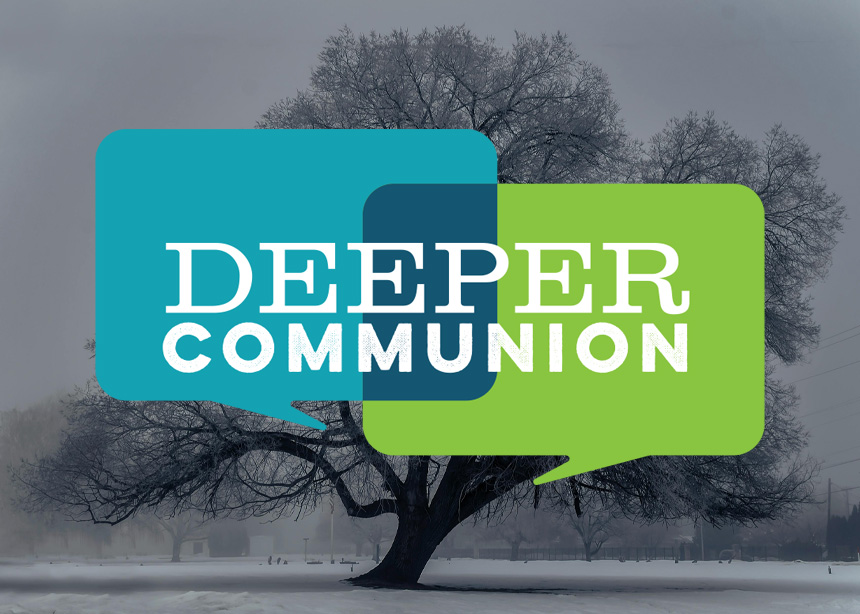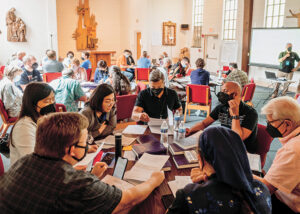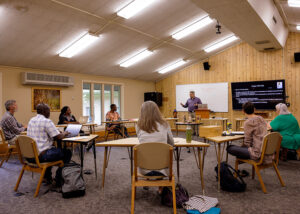In the faith community of my youth, church leaders were held in extremely high esteem. The expectation of respect for leaders weighed heavily, for better and worse. To respond to a call, to serve and to be an elder or pastor in the church, meant equal parts responsibility and regard.
Growing up, I was taught this both explicitly, through words, and implicitly, through action. From things as big as the annual deacon and elder elections to small things like ensuring children called pastors by their respective titles, leaders were held high, and much was expected from them.
Imagine the challenge I faced as I sat one day in the Anabaptist History and Thought class at Columbia Bible College and heard for the first time in my life about a whole Christian tradition that exists apart from dominant Catholic and Protestant expressions, one that takes the idea of a “priesthood of all” to its logical end, a tradition that believes church is not dictated from up top but from below. That is, the lives of everyday, ordinary Christians can witness more powerfully to the reign of God than that which is imposed by authorized institutions.
Therefore, community must be voluntary, scripture must be read together, baptism must be chosen in adulthood, churches must not be knit to states and so on.
This was revolutionary for me, and I have been pondering the implications ever since, attracted helplessly to a faith that looks to and empowers the everyday person in community, rather than looking to established figureheads and overseers.
As I ponder these phases of my life today, however, I find myself looking for some sort of synthesis. A little time, experience and distance is allowing me to rethink this either/or approach— that a community must either focus totally on its leaders at the expense of the community, or the reverse.
Today, I ask: how might Anabaptist-Mennonite visions of leadership and church impact, both positively and negatively, our ability to discern our place in the world?
For example, does an overemphasis on grassroots organizing keep us from hearing our leaders, thus impeding our ability to grow in areas we must? Or maybe the leaders we choose to guide us, in fact, feel disempowered to make the decisions they feel led to make, because that is not how we operate.
Does fear of overstepping cause ministers to shy away from offering their gifts? Or the opposite—how might an overemphasis on communal discernment allow those who lead to shirk their responsibility to lead?
In my experience and observation, sometimes Anabaptists wrestle with these questions well, and sometimes poorly. I believe we can be a valuable witness to the structures of our world, and I want to continue to press into that. At the same time, it would be good for us to ask whether we trust our leaders to lead. Do we trust each other to follow? Will leaders take responsibil- ity to lead? And will all of us take responsibility to let them lead?
In this all, I still hear a voice from my childhood say, “With great power comes great responsibility.” I pray we understand both the power and responsibility—equally and together, that leading may come from above and below, understanding that Jesus is ultimately the head of it all. So the next time you’re at a congregational meeting, trying to pass a budget, hiring a new pastor, wondering how churches might work together, or organizing for a cause with other Anabaptists, consider this: what is the flow of leadership in the scenario; what are the underlying assumptions; and how do they function to further the community along the Jesus Way?
Justin Sun is a student at Vancouver School of Theology/Vancouver Coastal Health.
Reflection by Anika Reynar
To me, the priesthood of all believers is beautiful because it invites anyone to be a leader. People lead in particular times and places, and they follow in others.
A good leader honestly and accur- ately reflects a community back to itself. This builds trust. It is also core to Anabaptism: the belief that we cannot fully know ourselves, that we learn to see ourselves through the other. In the way of Jesus, this other often shows up as the marginalized, the oppressed or the one who has been denied formal positions of leadership.
For me, the question is less about whether we trust our leaders, and more about who we trust to accurately help us to discern what our faith is calling us towards.
I hear Justin speaking primarily about leaders in formal roles: pastors, regional or national ministers. These leaders are important, and yet, I suspect that leadership “from above” is only as good as the practices of discernment within and between communities. I see leaders (formal or not) as holding the responsibility to listen closely and support this discernment, while also reflecting pieces that have been missed. When our leaders honestly and vulnerably reflect our hopes, desires and struggles, it becomes easier to trust their direction.
Anika Reynar works in Boston as a facilitator and mediator in environmental disputes.
Trust by Ryan Dueck
I find myself returning to a word Justin mentions near the end of his article.
Trust. I doubt I’m alone in worrying about the low-trust culture we are collectively creating.
Very often, we do not trust our leaders, whether this is in government, science, healthcare, media or the church. Sometimes this lack of trust is richly deserved (the list of leaders behaving badly is, unfortunately, a very long and tiresome one). Sometimes we simply want to be our own authorities and will only tolerate leaders who confirm our preferences and tell us what we already think. The rise of social media and a perpetually online culture only makes this worse. Suspicion and resentment are algorithmically (and profitably!) engineered. As a result, trust is decimated.
Whatever structures of leadership we end up adopting or synthesizing in the church will fail without at least some level of trust. Yes, we must be wise and discerning. But we also cannot give up on trust and fall prey to the cheap and easy cynicism that crouches at our door. A community that claims to worship and follow the Servant King must point to a better way in this cultural moment, both in how we lead and in how we are led.
Ryan Dueck is pastor at Lethbridge (Alberta) Mennonite Church.
Transparency by Cindy Wallace.
Like Justin, I’m compelled by a grassroots recognition of an all-believers’ priesthood that still honours the way the Spirit has equipped and gifted members of our congregations in distinctive roles. I think the questions Justin raises about leadership invite us to think about the related categories of power and prestige.
We sometimes critique explicit shows of power or prestige while allowing them to function implicitly through old social connections, unspoken traditions or passive aggression. Power is going to be at play among us; the question is whether we’re telling the truth about how it’s working in our communities. We could probably all do with more transparency.
I also wonder about our influences. In Matthew 20:24–26, Jesus advises his disciples not to follow the reigning cultural modes of leadership. Few Anabaptists are kissing priests’ rings these days after the model of ancient emperors, but I wonder whether our tempting cultural influence might be business styles of leadership.
Are our church leaders learning from CEOs and CFOs to prioritize efficiency, measurable outcomes and PR management over the mysterious and life-giving guidance of the Spirit? What does it look like to lead in the way of Christ here and now, with humility and truth?
Cindy Wallace is professor of English at St. Thomas More College at the University of Saskatchewan.








Leave a Reply
You must be logged in to post a comment.